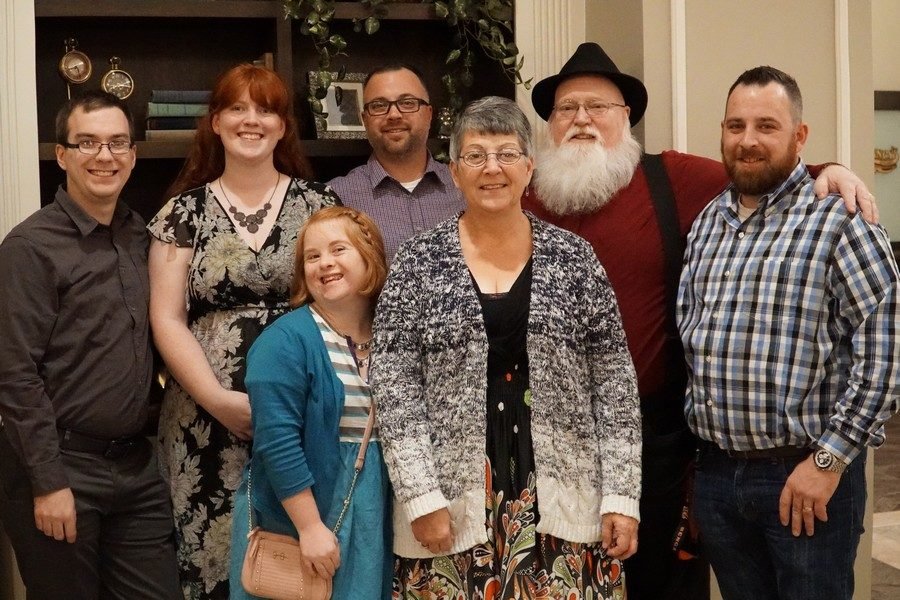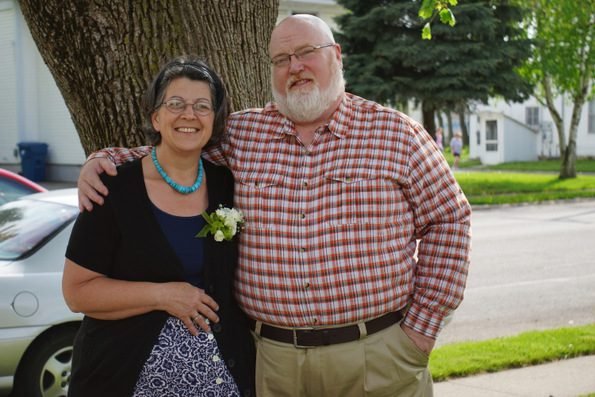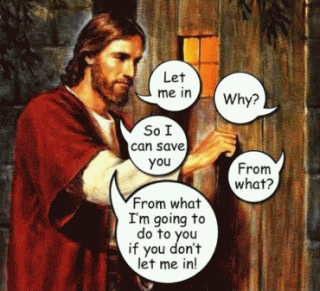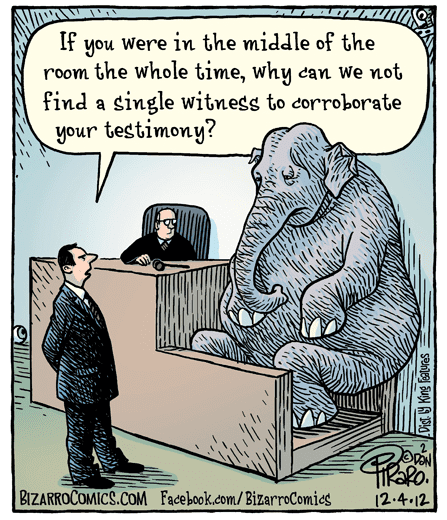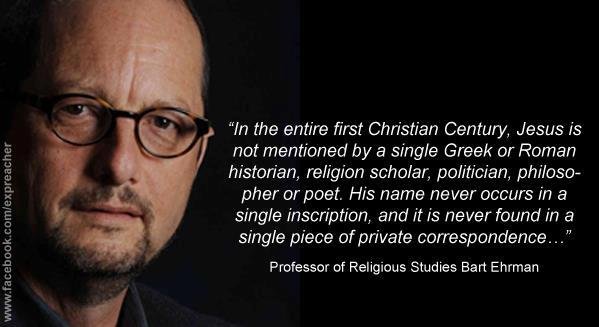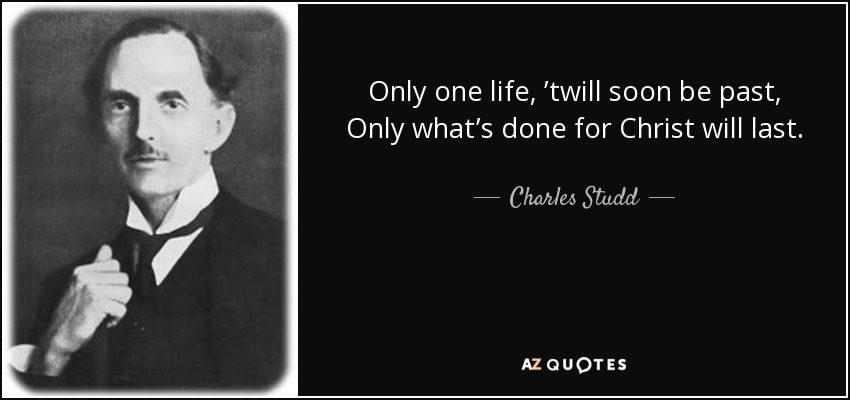
Ye are bought with a price; be not ye the servants of men. (1 Corinthians 7:23)
Yea doubtless, and I count all things but loss for the excellency of the knowledge of Christ Jesus my Lord: for whom I have suffered the loss of all things, and do count them but dung, that I may win Christ. (Philippians 3:8)
Love not the world, neither the things that are in the world. If any man love the world, the love of the Father is not in him. (i John 2:15)
I must work the works of him that sent me, while it is day: the night cometh, when no man can work. The night is far spent, the day is at hand: let us therefore cast off the works of darkness, and let us put on the armour of light. But the day of the Lord will come as a thief in the night; in the which the heavens shall pass away with a great noise, and the elements shall melt with fervent heat, the earth also and the works that are therein shall be burned up. (John 9:4, Romans 13:12, 2 Peter 3:10)
For though I preach the gospel, I have nothing to glory of: for necessity is laid upon me; yea, woe is unto me, if I preach not the gospel! (1 Corinthians 9:16)
Then said Jesus unto his disciples, If any man will come after me, let him deny himself, and take up his cross, and follow me. (Matthew 16:24)
For the grace of God that bringeth salvation hath appeared to all men, Teaching us that, denying ungodliness and worldly lusts, we should live soberly, righteously, and godly, in this present world; Looking for that blessed hope, and the glorious appearing of the great God and our Saviour Jesus Christ; Who gave himself for us, that he might redeem us from all iniquity, and purify unto himself a peculiar people, zealous of good works. (Titus 2:11-14)
I beseech you therefore, brethren, by the mercies of God, that ye present your bodies a living sacrifice, holy, acceptable unto God, which is your reasonable service. And be not conformed to this world: but be ye transformed by the renewing of your mind, that ye may prove what is that good, and acceptable, and perfect, will of God. (Romans 12:1,2)
These verses and others became the primary motivators of my life for much of the twenty-five years I spent in the ministry. My belief that the Bible was the inspired, inerrant, infallible word of God — a book written by God, not men — caused me to believe that, as I read these verses, God was speaking directly to me. I knew that God had saved me and called me into the ministry, and that if I devoted every moment of every day to following after Jesus, this would be time well spent. I knew that life was short, death was certain, Hell was hot, and judgment was sure; that soon Bruce Gerencser was going to die and that he was going to stand before a thrice-holy God and give an account for what he did with his life. Using the Disciples as my example, I set out to leave everything that mattered to me and follow Jesus. This meant that, even though I was married to a beautiful, wonderful woman and would over the years have six precious children with her, everything was secondary to my call to the ministry and preaching the gospel of Jesus Christ. As anyone who knew me in my Evangelical days will tell you, I was a true-blue, on-fire disciple of Christ. My goal in every one of the communities I pastored was to preach the gospel to as many people as possible and to motivate Christians to set aside the things of the world, focusing instead on the present and coming Kingdom of God. I knew that congregants would never be more than what was modeled to them, so I did my best to be a shining example of someone who loved God and took seriously the commands and teachings of the Bible. How this worked out in my life is tragic, a somber reminder of what happens when people give themselves over to fanaticism.
As I contemplated writing this post, I thought about all the things I missed out on or didn’t get to see because my mind was totally focused on the ministry and reaching people with the gospel. Not helping matters was the fact that I was a perfectionist, which later developed into full-blown Obsessive-Compulsive Personality Disorder (OCPD). Everywhere I looked there were sinners in need of saving. How could I take time off from work or go on a vacation as long as there were people who needed to hear the gospel? While I certainly would have loved to have spent more time with my wife and children, how could I justify doing so when there were so many people living in sin, seemingly without having anyone in their lives willing to tell them the truth about their eternal destiny. I quickly developed what I call the Elijah syndrome, that I was the only prophet remaining that was willing to do all that was necessary to preach the gospel to lost and dying sinners. It should come, then, as no surprise that I often worked seven days a week, frequently preaching five to seven sermons during that time. When I wasn’t preaching, I was busy knocking on doors, visiting people in the hospital, handing out tracts, working on the church building, transporting people to services, and talking to people in need of my counsel. As Polly will testify, I worked long hours, rarely taking time off for entertainment or personal relaxation.
Here are a few of the things I missed while serving Jesus.
I missed out on watching my older sons play competitive sports. Not because I didn’t have the time to go to their games, but because I wouldn’t let them play sports due to game and practice schedules conflicting with church activities. I fondly remember the days when I played little league and pony league baseball, but my sons never had an opportunity to play baseball because their preacher father thought it more important for them to be sitting in church than playing meaningless, worldly games. I thought, How could I set a good example to the church if on church nights the preacher’s kids were busy playing sports and not in attendance? My children, unfortunately, were never allowed to just be. I expected them to be perfectly behaved, regardless of the fact that other church children were not. I expected my children to set the example, and this meant that they were not going to be able to do some of the other things that “normal” children were allowed to do.
We lived in Southeast Ohio for almost twelve years. During this time, I pastored a fast-growing church that for many years operated a large bus ministry and a private Christian school. If there was one church where my workaholic, OCPD mentality was on display, it was here. During my time as pastor of Somerset Baptist Church, I took all of one vacation, a trip to Boston Massachusetts, paid for by Bruce Turner. Bruce had been the youth pastor at Trinity Baptist Church in Findlay Ohio when I was saved and called to the ministry. One year, I had Bruce come to our church to preach for our anniversary. The building was packed, a not-so-subtle reminder that young Bruce had learned well the lessons taught to him by older Bruce a decade and a half ago. Older Bruce had, however, aged and matured in his understanding of the ministry. As he spent several days observing his protégé’s ministerial work, he concluded that I was burning the candle at both ends, and that if I didn’t learn to relax and spend time away from the ministry, I was going to cause myself physical harm. And it is for these reasons that Bruce offered to pay for us to take a trip to Massachusetts. This would be the first and last vacation I would take until the late 1990s. While I “heard” what Bruce was trying to tell me, his voice was drowned out by what I perceived to be the Holy Spirit telling me to give my all to Jesus; telling me that if I were a true disciple of Christ, I must be willing to forsake all attachments to this world; telling me that my wife and children were not as important as following Jesus and preaching the gospel; telling me that Jesus was coming soon that I must be about my father’s business, for the night is coming when no man can work.
In the mid to late-1980s, I made three exceptions to my on-call-for-Jesus 24/7 work schedule. The first exception that I carved out of my schedule was three hours once a week to play basketball with a group of men I had met through one of the teenage boys who attended the church. None of these men was Christian, so I suspect deep down I saw playing basketball with them as an opportunity to evangelize them. Ironically, I made very little effort to do so. Over time, I saw these three hours as a refuge away from the pressures of the ministry. In retrospect, this once-a-week full-court workout was likely medicine of sorts that kept me from physically and mentally destroying myself.
The second exception on my schedule was weekly trips during the summer to local dirt race tracks. My best friend in the church, Harold Miller, asked me if I had ever been to a dirt track race. I told him that I had, but I hadn’t attended a race since the mid-1970s. And so we went — Polly and the boys included, along with 2 toddler girls — regularly on Friday and Saturday nights to racetracks such as Midway Speedway, Muskingum County Speedway, R&R Speedway, and Skyline Speedway. On nights that Polly didn’t want to go, I would pack up the boys and we would go to the races. Again, I saw our weekly visits to these racetracks as a respite of sort from the constant — often self-inflicted — demands of the ministry. There were plenty of sinners at the races we attended, but I made no effort to evangelize anyone. For three to five hours once a week I allowed myself to be immersed in a sea of worldlings, observing but never partaking.
When my evangelist friend Don Hardman heard that I was regularly attending local dirt track races, and – say it isn’t so, Bruce! taking my family with me, he rebuked me for attending such worldly events. Fortunately, I ignored him. I have no doubt that going to the races helped me maintain my sanity and allowed me to physically relax. (One humorous story from these days comes from a warm spring day when I was preaching on a street corner in Zanesville, Ohio. Pulling up to the traffic light was one of the regular late-model drivers at Midway Speedway. Seizing the opportunity to “share” the gospel with this man, I began preaching, mentioning him by name. He turned towards me with a look on his face that suggested I had scared the living daylights out of him. Several months later I ran into him, reminding him of my brief sermon on that spring day. He said to me, you scared the shit out of me!)
The third exception came when I would load Polly and the children into whatever beater we were driving at the time and take day road trips to Southern Ohio and West Virginia. All we needed was enough money for gas and off we would go. Polly would pack us food and snacks, so there was no need to stop at restaurants to eat. We traveled countless back roads, often ending up in places that were small dots on a road map. Polly and I, along with our children, have many fond memories of these trips, including the time we drove to southern West Virginia so we could take a train ride, only to arrive just as the last train of the day was pulling out from the station. Boy, there’s a metaphor in this story. 🙂
Three hours of basketball once a week, three to five hours on summer weekends watching dirt track races, one vacation, and occasional road trips…. that’s all the time I took off from serving Jesus. According to the Bible, I was Jesus’ bondslave. The song in my heart was the classic Baptist hymn:
All to Jesus I surrender, all to him I freely give, I will ever love and trust Him, In His presence daily live.
All to Jesus I surrender, humbly at His feet I bow. Worldly pleasures all forsaken, Take me, Jesus, take me now.
All to Jesus I surrender, make me Savior wholly thine. May Thy Holy Spirit fill me, may I know Thy power divine.
I surrender all I surrender all. All to Thee my blessed Savior I surrender all.
There were also church outings to Kings Island, the bowling alley, the roller rink, canoe livery, and a host of other activities, but these events were tools used by me to evangelize unaware sinners. I would encourage congregants to invite their friends and neighbors to these events, telling them to emphasize how much fun these activities were. Once there, I would round everyone up and spend some time sharing the gospel with them. Doing this told congregants without saying a word that having fun for fun’s sake took a backseat to evangelizing the lost.
People who have traveled to Southeast Ohio will tell you about its beauty and rolling hills. It’s too bad that I had no time for enjoying the wonders of God’s creation. All around me was beautiful scenery, but all I could see was sin-stained hearts in need of salvation. Polly and I are planning on taking a trip back to Southeast Ohio this summer to spend a few days visiting all the places that we never got to see because Jesus had other things for us to do. Several days ago, as we were browsing travel literature for Southeast Ohio, we were amazed at how many wonderful things there were to see. Too bad we didn’t take the time to see them when we were young, when our children were home, and when our bodies were better fitted for hiking and visiting such wonders as Old Man’s Cave at Hocking Hills.
The same can be said for the seven months I spent as co-pastor of Community Baptist Church in Elmendorf Texas — a small community just south of San Antonio. While at Community, I spent eight days a week doing the work of the ministry. During my time there I established a Christian school, started two churches, established a nursing home ministry, set up a street-preaching ministry, along with preaching twice a week. As you can see, I was busy, busy, busy for Jesus, with no time for family or relaxation. I suspect I am one of the few people to ever live in San Antonio and not go on the Riverwalk, visit the Alamo, view San Antonio from the towering height of the Tower of the Americas, or see any of the other sites people typically visit when vacationing in San Antonio. I did, however, preach in front of the Alamo, as I did above the walkways that led down to the Riverwalk. All around me was beauty, from the natural landscape to ancient buildings, but I was blind to these things because my eyes were fixed on Jesus, the author and finisher of my faith; the Jesus who took my sins upon himself and died for me on the cross; the Jesus who commanded me to be perfect even as his father in Heaven is perfect; the Jesus who commanded me:
If any man come to me, and hate not his father, and mother, and wife, and children, and brethren, and sisters, yea, and his own life also, he cannot be my disciple. And whosoever doth not bear his cross, and come after me, cannot be my disciple. So likewise, whosoever he be of you that forsaketh not all that he hath, he cannot be my disciple. (Luke 14:26,27,33)
I am sure that some of the Evangelicals who read this post will suggest that what I needed in my life was balance; that I was too focused on the eternal; that I needed to give myself time to rest and relax. The problem with this type of thinking is that it is modeled nowhere in the lives of Jesus, the apostles, or any of the disciples. I can’t think of one Bible verse that suggests Christians should take it easy until Jesus comes again, or that the followers of Christ should pace themselves as they serve the King of Kings and Lord of Lords. Paul spoke of running a race, and I thought, at the time, better to burn out than rust out. Better to live forty years of life as a brightly shining star than eighty years as a dim star that could only be seen with a telescope.
It was in the late 1990s before I finally realized what a fool I had been. By that time, health ruined and diagnosed with Fibromyalgia, I could no longer keep up the pace of previous years. During this time, thanks to the atheist husband of one of the ladies who attended Our Father’s House in West Unity, the church I was pastoring at the time, I developed a love for photography. I am convinced that this one thing saved my life. I began taking time off so we could take day trips and vacations to places that provided opportunities for me to work on my photography skills. Countless hours were spent slowly driving the back roads of Michigan, Indiana, and Ohio, looking for photographic opportunities. These trips gave me a psychological break from the demands of the ministry. Thanks to my Calvinistic beliefs, I no longer felt driven to spend every waking hour evangelizing the lost. I was content to preach two sermons a week, take care of the needs of a small congregation, and spend the rest of my time enjoying life. We began taking vacations, attending races at the local dirt track, and visiting nearby attractions. Our oldest three boys were old enough to babysit their younger siblings, so this afforded Polly and me the opportunity to get away from the church and home without our children. By then, our economic position had greatly improved thanks to Polly working full time at Sauder Woodworking and our two older sons paying room and board. Having more discretionary money allowed us to do a lot of things that we never could have done years before. I can honestly say that the seven years I spent as pastor of Our father’s House were the best years of my ministerial career. The church never grew above fifty or sixty people, but I found this particular group of people, with a couple of exceptions, a delight to pastor. I suspect that if I had been able to ignore the nagging voice of the “Holy Spirit,” I could have continued pastoring this church for years.
You might wonder what I mean by the nagging voice of the “Holy Spirit.” As I settled into the life typically led by Evangelical pastors, I found myself increasingly feeling guilty over time spent relaxing. I’m sure Polly could tell stories of her own about the long discussions we had about whether we were doing enough for Jesus. I quite enjoyed our new life with its pleasures and relaxing opportunities, but I never could get out of my head all the things I mentioned above. Never far from my thoughts were my Master and his call to follow after him. I don’t want to give the impression that I was some sort of worldly Christian, I wasn’t. I still spent an inordinate amount of time reading and studying the Bible, praying, preaching sermons, and doing the work of the ministry, but I did give myself space for pleasure and relaxation. This was a step in the right direction, but I would find out a few short years later that if I really wanted to have a life worth living, I was going to have to divorce myself from the ministry and God.
Now that I have liberated myself from the constraints of the Bible, I am free to live life as I see fit. Realizing that life is short and death is certain (sooner than later), I try to spend as much time as possible doing the things I want to do and with the people I love most — my family. My bucket list for the next ten weeks: two Dayton Dragons baseball games, Breaking Benjamin concert, Halestorm concert, and a week’s vacation in Shawnee/Newark, Ohio, (along with having our house painted and carpet installed in several rooms). I no longer hear nagging voices in my head telling me to forsake my family, houses, and lands and follow Jesus. I no longer worry about WWJD — what would Jesus do (or what would church members think). Both Polly and I love where we are in life, though we do wish that we had come to an understanding about what really matters twenty-five years sooner. Sadly, we can’t undo the past, but we can choose to live differently, and that is exactly what we are doing.
Bruce Gerencser, 68, lives in rural Northwest Ohio with his wife of 47 years. He and his wife have six grown children and sixteen grandchildren. Bruce pastored Evangelical churches for twenty-five years in Ohio, Texas, and Michigan. Bruce left the ministry in 2005, and in 2008 he left Christianity. Bruce is now a humanist and an atheist.
Your comments are welcome and appreciated. All first-time comments are moderated. Please read the commenting rules before commenting.
You can email Bruce via the Contact Form.

